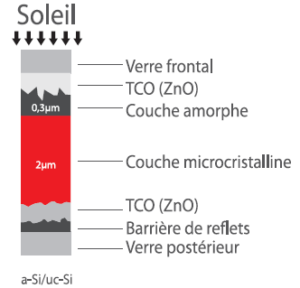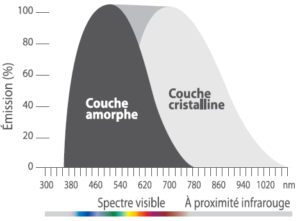The Solar PV industry is full of innovation, in this article, Greensolver’s experts explore the benefits of micromorph solar panels.
Micromorph modules are made of an upper layer of amorphous silicon & a microcrystalline layer at the bottom – see picture. The upper layer uses the visible area of solar spectrum when the bottom one absorbs the infrared region.

One of the biggest advantages of those solar panels is the silicon-dependence reduction. Moreover, micromorph solar panels are really interesting for producing even with a very low irradiation.
Indeed, thanks to their structure, they are able to absorb a wider light spectrum than crystalline or amorphous modules. In theory, they are able to produce more energy than crystalline modules in case of diffuse sunlight (diffraction of light by the clouds and the particles present in the atmosphere, and its refraction by the ground) by up to 12%.

It has to be noted that micromorph module can be sensitive to the Staebler-Wronski effect: a significant decrease in the photo-conductivity of a material when under exposed to light. A peak power degradation can be noticed because of the radiation exposure and until stabilization.
Greensolver would like to learn more about your experience with micromorph solar panels in regions with an average annual irradiation (~1300 Wh/sqm). Do not hesitate to contact us to let us know.

